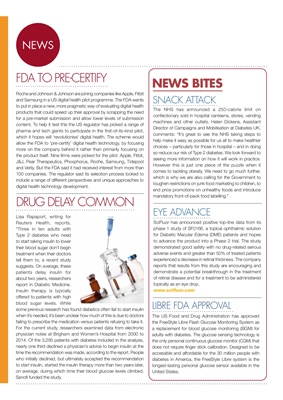
NEWS
Roche and Johnson & Johnson are joining companies like Apple, Fitbit
and Samsung in a US digital health pilot programme. The FDA wants
to put in place a new, more pragmatic way of evaluating digital health
products that could speed up their approval by scrapping the need
for a pre-market submission and allow lower levels of submission
content. To help it test this the US regulator has picked a range of
pharma and tech giants to participate in the first-of-its-kind pilot,
which it hopes will 'revolutionise' digital health. The scheme would
allow the FDA to 'pre-certify' digital health technology, by focusing
more on the company behind it rather than primarily focusing on
the product itself. Nine firms were picked for the pilot: Apple, Fitbit,
J&J, Pear Therapeutics, Phosphorus, Roche, Samsung, Tidepool
and Verily. But the FDA said it had received interest from more than
100 companies. The regulator said its selection process looked to
include a range of different perspectives and unique approaches to
digital health technology development.
SciFluor has announced positive top-line data from its
phase 1 study of SF0166, a topical ophthalmic solution
for Diabetic Macular Edema (DME) patients and hopes
to advance the product into a Phase 2 trial. The study
demonstrated good safety with no drug-related serious
adverse events and greater than 50% of treated patients
experienced a decrease in retinal thickness. The company
reports that results from this study are encouraging and
demonstrate a potential breakthrough in the treatment
of retinal disease and for a treatment to be administered
topically as an eye drop.
www.scifluor.com
The US Food and Drug Administration has approved
the FreeStyle Libre Flash Glucose Monitoring System as
a replacement for blood glucose monitoring (BGM) for
adults with diabetes. The glucose sensing technology is
the only personal continuous glucose monitor (CGM) that
does not require finger stick calibration. Designed to be
accessible and affordable for the 30 million people with
diabetes in America, the FreeStyle Libre system is the
longest-lasting personal glucose sensor available in the
United States.
LIBRE FDA APPROVAL
NEWS BITES
The NHS has announced a 250-calorie limit on
confectionary sold in hospital canteens, stores, vending
machines and other outlets. Helen Dickens, Assistant
Director of Campaigns and Mobilisation at Diabetes UK,
comments: "It's great to see the NHS taking steps to
help make it easy as possible for us all to make healthier
choices - particularly for those in hospital - and in doing
so reduce our risk of Type 2 diabetes. We look forward to
seeing more information on how it will work in practice.
However this is just one piece of the puzzle when it
comes to tackling obesity. We need to go much further,
which is why we are also calling for the Government to
toughen restrictions on junk food marketing to children, to
end price promotions on unhealthy foods and introduce
mandatory front-of-pack food labelling."
SNACK ATTACK
EYE ADVANCE
FDA TO PRE-CERTIFY
DRUG DELAY COMMON
Lisa Rapaport, writing for
Reuters Health, reports,
"Three in ten adults with
Type 2 diabetes who need
to start taking insulin to lower
their blood sugar don't begin
treatment when their doctors
tell them to, a recent study
suggests. On average, these
patients delay insulin for
about two years, researchers
report in Diabetic Medicine.
Insulin therapy is typically
offered to patients with high
blood sugar levels. While
some previous research has found diabetics often fail to start insulin
when it's needed, it's been unclear how much of this is due to doctors
failing to prescribe the medication versus patients refusing to take it.
For the current study, researchers examined data from electronic
physician notes at Brigham and Women's Hospital from 2000 to
2014. Of the 3,295 patients with diabetes included in the analysis,
nearly one third declined a physician's advice to begin insulin at the
time the recommendation was made, according to the report. People
who initially declined, but ultimately accepted the recommendation
to start insulin, started the insulin therapy more than two years later,
on average, during which time their blood glucose levels climbed.
Sanofi funded the study.